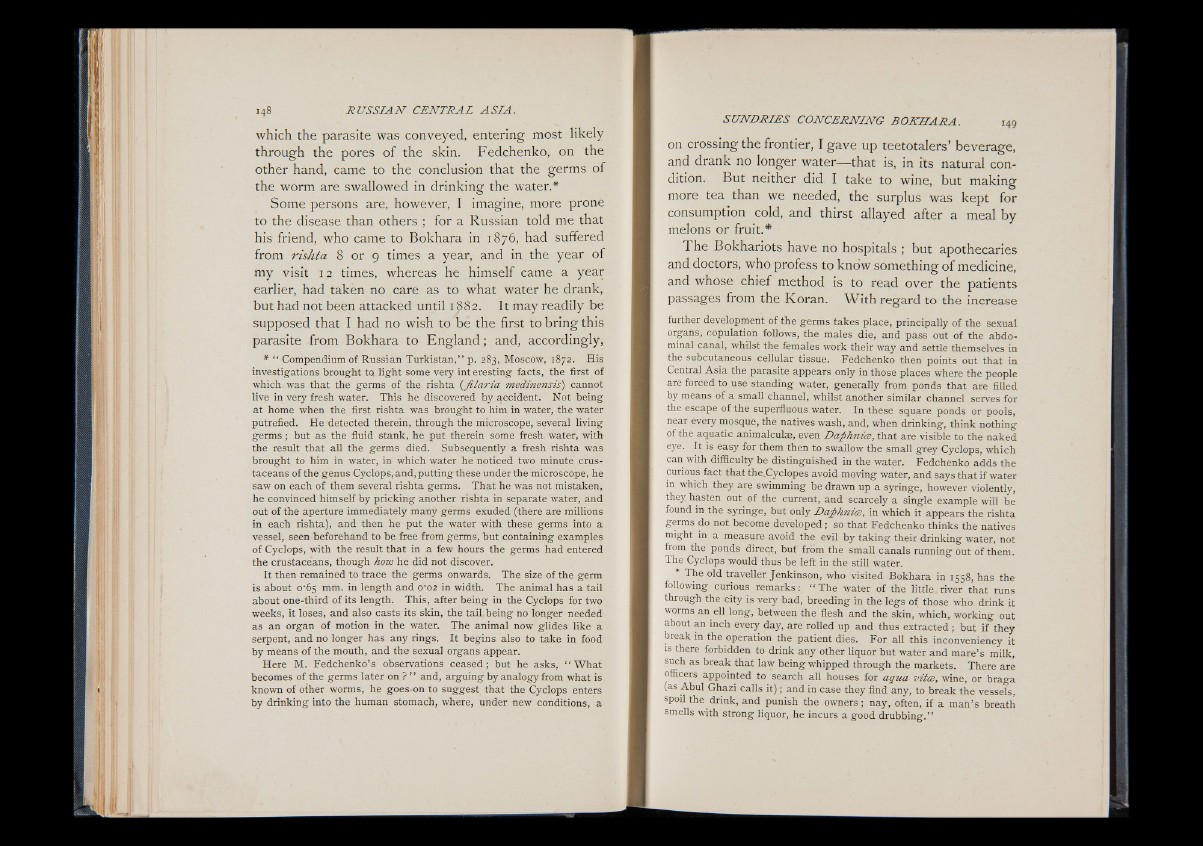
which the parasite was conveyed, entering most likely
through the pores of the skin. Fedchenko, on the
other hand, came to the conclusion that the germs of
the worm are swallowed in drinking the water.*
Some persons are, however, I imagine, more prone
to the disease than others ; for a Russian told me that
his friend, who came to Bokhara in 1876, had suffered
from rishta 8 or 9 times a year, and in the year of
my visit 12 times, whereas he himself came a year
earlier, had taken no care as to what water he drank,
but had not been attacked until 1882. It may readily be
supposed that I had no wish to be the first to bring this
parasite from Bokhara to England; and, accordingly,
* “ Compendium of Russian Turkistan,” p. 283, Moscow, 1872. His
investigations brought to light some very int eresting facts, the first of
which, was that the germs of the rishta (filaria medinensis) cannot
live in very fresh water. This he discovered by accident. Not being
at home when the first rishta was brought to him in water, the water
putrefied. He detected therein, through the microscope, several living
germs; but as the fluid stank, he put therein some fresh water, -with
the result that all the germs died. Subsequently a fresh rishta was
brought to him in water, in which water he noticed two minute crustaceans
of the genus Cyclops, and, putting these under the microscope, he
saw on each of them several rishta germs. That he was not mistaken,
he convinced himself by pricking another rishta in separate water, and
out of the aperture immediately many germs exuded (there are millions
in each rishta), and then he put the water with these germs into a
vessel, seen beforehand to be free from germs, but containing examples
of Cyclops, with the result that in a few hours the germs had entered
the crustaceans, though how he did not discover.
It then remained to trace the germs onwards. The size of the germ
is about 0-65 mm. in length and 0'02 in width. The animal has a tail
about one-third of its length. This, after being in the Cyclops for two
weeks, it loses, and also casts its skin, the tail, being no longer needed
as an organ of motion in the water. The animal now glides like a
serpent, and no longer has any rings. It begins also to take in food
by means of the mouth, and the sexual organs appear.
Here M. Fedchenko’s observations ceased; but he asks, “ What
becomes of the germs later on ? ” and, arguing by analogy from what is
known of other worms, he goes.on to suggest that the Cyclops enters
by drinking into the human stomach, where, under new conditions, a
on crossing the frontier, I gave up teetotalers’ beverage,
and drank no longer water— that is, in its natural condition.
But neither did I take to wine, but making
more tea than we needed, the surplus was kept for
consumption cold, and thirst allayed after a meal by
melons or fruit.*
The Bokhariots have no hospitals ; but apothecaries
and doctors, who profess to know something o f medicine,
and whose chief method is to read over the patients
passages from the Koran. With regard to the increase
further development of the germs takes place, principally of the sexual
organs, copulation follows, the males die, and pass out of the abdominal
canal, whilst the females work their way and settle themselves in
the subcutaneous cellular tissue. Fedchenko then points out that in
Central Asia the parasite appears only in those places where the people
are forced to use standing water, generally from ponds that are filled
by means of a small channel, whilst another similar channel serves for
the escape of the superfluous water. In these square ponds or pools,
near every mosque, the natives wash, and, when drinking, think nothing
of the aquatic animalculse, even Dafthnice, that are visible to the naked
eye. It is easy for them then to swallow the small grey Cyclops, which
can with difficulty be distinguished in the water. Fedchenko adds the
curious fact that the.Cyclopes avoid moving water, and says that if water
in which they are swimming be drawn up a syringe, however violently,
they hasten out of the current, and scarcely a single example will be
found in the syringe, but only Dafihnice, in which it appears the rishta
germs do not become developed; so that Fedchenko thinks the natives
might in a measure avoid the evil by taking their drinking water, not
from the ponds direct, but from the small canals running out of them.
The Cyclops would thus be left in the still water.
* The old traveller Jenkinson, who visited Bokhara in 1558, has the
following curious remarks: “ The water of the little,river that runs
through the city is very bad, breeding in the legs of those who drink it
worms an ell long, between the flesh and the skin, which, working out
about an inch every day, are rolled up and thus extracted ; but if they
break in the operation the patient dies. For all this inconveniency it
is there forbidden to drink any other liquor but water and mare’s milk,
such as break that law being whipped through the markets. There are
officers appointed to search all houses for aqua vitce, wine, or braga
(as Abul Ghazi calls it); and in case they find any, to break the vessels,
spoil the drink, and punish the owners ; nay, often, if a man’s breath
smells with strong liquor, he incurs a good drubbing.”